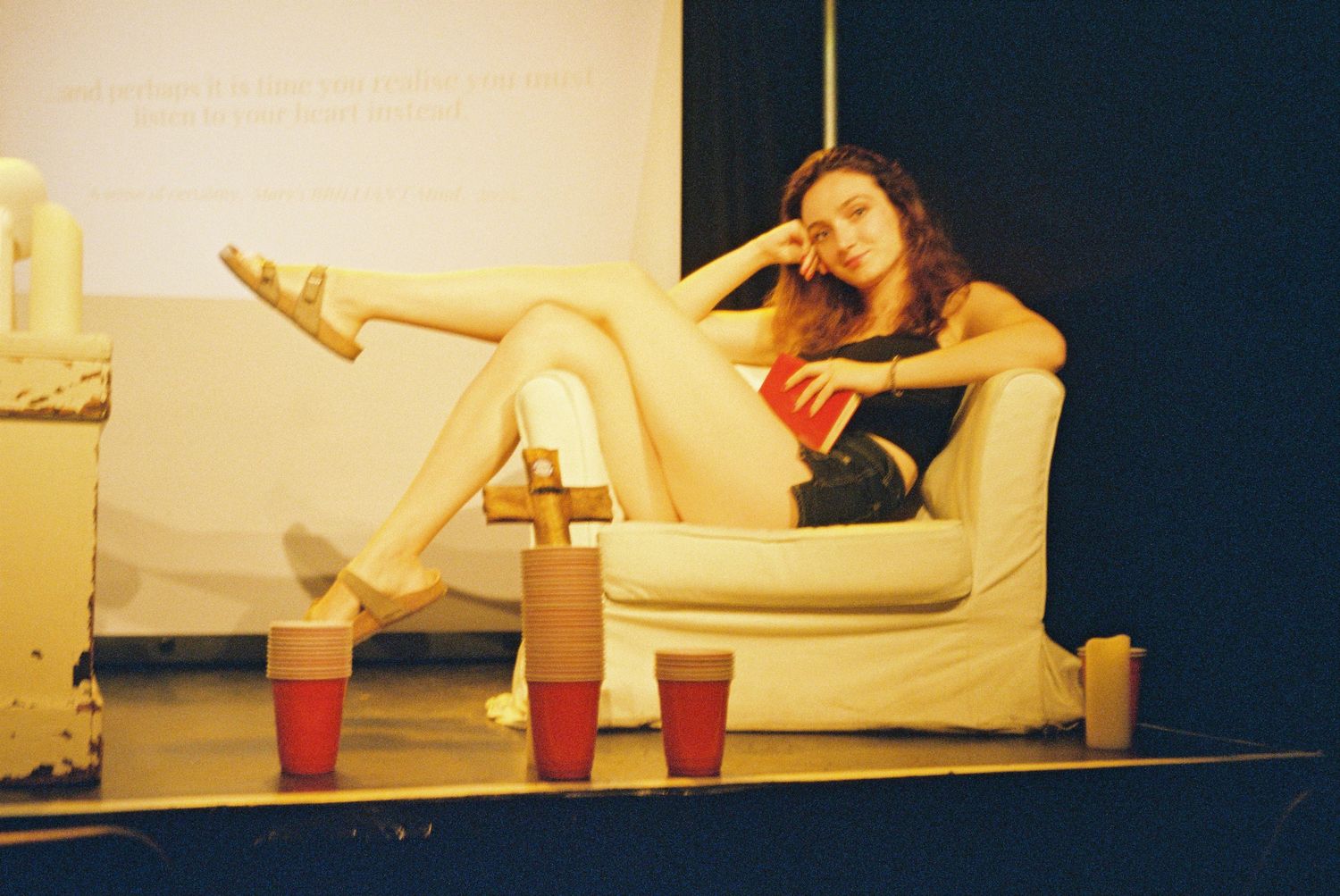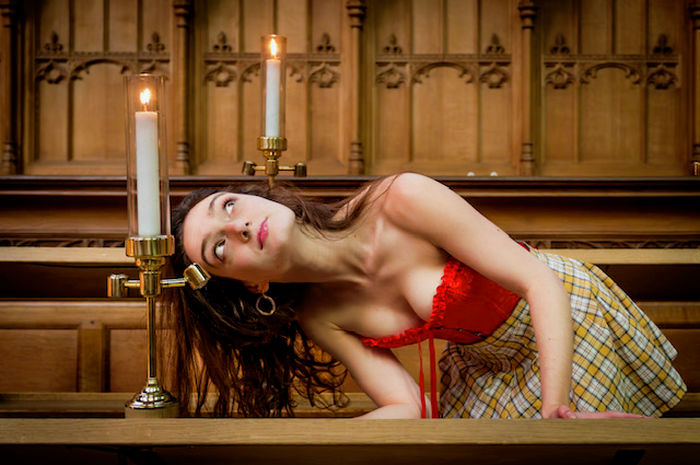Disclaimer: I do not enjoy writing about myself. Ironic, I know, considering my biggest legacy at Cambridge was writing and performing an autofictitious one-woman show, but it’s true. Or, perhaps, more accurately, I should say that I do not enjoy writing as myself, and vastly prefer the safety of a performative persona. I’ve said many times over the course of this past year that what I cherished most about Me and My Year of Casual Monasticism is how Mary, my on-stage altar ego, has the strength to voice aloud things the real-life Emily cannot.
So, when Varsity approached me to write about my experiences at the Fringe, I entered into a small-scale panic. No longer could I hide behind ‘Mary’; writing an article would necessitate being exposed authentically as Emily. And, while bringing my one-woman show to the Edinburgh Fringe was overwhelmingly positive, there was, unfortunately, one wart decorating the otherwise flawless face of my experience. A heckler, and a Cambridge University one at that, decided to disrupt one of my twenty-one evening shows.
“When I first dreamt up this show, no one appeared interested”
At first, my Fringe dreams seemed paper-thin; indeed, when I first dreamt up this show, no one appeared interested. It was almost comical. I mean, ordinarily when you post an application pack on CamDram someone reaches out saying something, but in my case, I got nothing. So, with mounting levels of panic, I realised I would have to be responsible for every cog in my metaphorical monastic wheel. Alone, I built the show from scratch, spending my evenings plotting out various lighting and sound cues, even though I’d never been involved in any technical aspects of theatre before in my life.
But, slowly but surely, people seemed eager to join my team. Cambridge peers began to know me through rumours of a new show, excitedly telling me how unique the concept appeared, and how interested they were in seeing it. Christina Huang and Jasper Harris made our first run at Pembroke possible, and Ewan Woods later took up the technical reins for our runs at Corpus and the Fringe. Once we reached the Fringe, the show seemed to morph into a phoenix, rapidly growing wings before swiftly taking flight. We received countless positive reviews from professional critics (three five stars and a plethora of four stars to be exact), features in magazines, and glowing audience reviews. Even flyering on the Royal Mile was a delight; day after day I would hold out flyers stapled with our newest five-star review and ask unwitting potential customers: “medieval pensises?” before talking their ear off about nude medieval manuscript doodles, desperate to spread the monastic word.
“As an artist, I knew this experience was making me grow”
Everything was perfect: our location was right on Royal Mile, our evening time slot was ideal, and as an artist, I knew this experience was making me grow. Furthermore, despite being a solo show, it actually fostered quite a community. Night after night, I was shocked by how audience members I could spot sporting college crested merchandise. I was honoured so many Cambridge students had found their way to me... until one dreadful night.
At first, I had been excited; I had foolishly believed that anyone associated with Cambridge would see my show with pure intentions. But, when they arrived, it swiftly became clear, even during the pre-show, that these individuals were going to be a problem. I did not know them well, but I knew them the way we all know certain university peers; through mutual followers on instagram, bumping into them at the ADC, or a fleeting nod when passing each other on King’s Parade. But, to my horror, it seemed that these particular peers attended this show with the goal of wreaking havoc. I wouldn’t delve too much into detail, but one person in particular, who was sitting in the front row, was speaking throughout the entire show, loudly clanking their alcoholic beverages, and, bizarrely, because they’d seen the production in Cambridge before, even mocking words they anticipated I was going to say.
I was nothing short of horrified; I had two reviewers in the audience that night, and worse still, an industry professional. Luckily, their poor behaviour had no long-term repercussions; I was able to ignore them for the entirety of the 45-minute show without blowing a single line, and was later commended for how seamlessly I handled the disruption.
But, the entire situation had left me so confused. I barely knew these people. I never thought that kind of vindictiveness could even be real! I tried to brush off their behaviour with excuses like drunkenness or even jealousy, but I myself could never fathom behaving in such a way at someone else’s show. After it happened, I sat alone, trying in vain to figure out the right thing to do. I did have footage, proof of their preposterous behaviour... should I have posted it? I could have, and indeed, reviewing the footage still makes my stomach churn, but, still, making that choice seemed certain to stroke the flames of an already burning pyre.
“It was a one-woman show afterall, and while I usually did not mind being a solo player, never before had I felt so alone”
But how could I let something like this slide? How could I let myself be silenced? And, more importantly, how could I handle the rest of the Fringe? I still had six more shows, agents booked to come see, and this experience had shaken me to the bone. Being so needlessly and cruelly harassed had rendered the very idea of stepping back on stage, to perform a show that meant so much to me, downright nauseating. It was a one-woman show afterall, and while I usually did not mind being a solo player, never before had I felt so alone.
Luckily, the very next evening, another audience member put everything into perspective. They made me realise why I decided to do this show in the first place, and indeed, why I’m even a performer at all. For, while flyering at my venue, I met a gentleman who was hearing impaired. Interested, he asked if I could explain further so he could know if it would be suitable for his needs. Once I showed him some photographs illustrating the ‘sexy ted-talk’ powerpoint set up of the play, he excitedly purchased a ticket.
Quickly, we reserved a place for the gentleman in the front row, in the very same seat the Cambridge heckler had occupied a mere twenty-four hours prior. To my delight, the gentleman genuinely enjoyed the production and through speaking with him later, I learned that the powerpoint actually rendered Casual Monasticism a far more accessible form of comedy than I had ever realised. The visual aids made the production substantially easier for a hearing-impaired individual to appreciate, rendering my own unique form of image-based comedy an accessible alternative previously missing from the traditional stand-up scene.
“Anyone could become a ‘sexy monk’ and identify with the themes of the show”
The conception of this show had been initially quite specific; it was based on my own experiences, and sought to empower other women and destigmatise domestic abuse. Yet, Fringe interactions like this made me realise that the true power of my show lay chiefly within the inclusive aspects of my ‘monastic’ world. Anyone could become a ‘sexy monk’ and identify with the themes of the show, and I am extraordinarily grateful to have learned that lesson in such a poignant way.
And so, while there may have been a few non-believers in my show’s audience, the message of Casual Monasticism remains clear: you must never allow yourself to be silenced, no matter what some people might attempt to refuse to let you speak.


